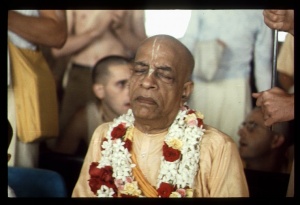CC Antya 5.102: Difference between revisions
m (1 revision(s)) |
No edit summary |
||
| Line 1: | Line 1: | ||
{{ | [[Category:Sri Caitanya-caritamrta - Antya-lila Chapter 05|CC102]] | ||
<div style="float:left">'''[[Sri Caitanya-caritamrta|Śrī Caitanya-caritāmṛta]] - [[CC Antya|Antya-līlā]] - [[CC Antya 5|Chapter 5: How Pradyumna Miśra Received Instructions from Rāmānanda Rāya]]'''</div> | |||
<div style="float:right">[[File:Go-previous.png|link=CC Antya 5.101|Antya-līlā 5.101]] '''[[CC Antya 5.101|Antya-līlā 5.101]] - [[CC Antya 5.103|Antya-līlā 5.103]]''' [[File:Go-next.png|link=CC Antya 5.103|Antya-līlā 5.103]]</div> | |||
{{CompareVersions|CC|Antya 5.102|CC 1975|CC 1996}} | |||
{{RandomImage}} | |||
==== TEXT 102 ==== | ==== TEXT 102 ==== | ||
<div | <div class="verse"> | ||
:'yadvā-tadvā' kavira vākye haya 'rasābhāsa' | |||
siddhānta-viruddha śunite nā haya ullāsa | :siddhānta-viruddha śunite nā haya ullāsa | ||
</div> | </div> | ||
| Line 12: | Line 16: | ||
==== SYNONYMS ==== | ==== SYNONYMS ==== | ||
<div | <div class="synonyms"> | ||
yadvā-tadvā | ''yadvā-tadvā kavira''—of any so-called poet; ''vākye''—in the words; ''haya''—there is; ''rasa-ābhāsa''—overlapping of transcendental mellows; ''siddhānta-viruddha''—against the conclusive understanding; ''śunite''—to hear; ''nā''—not; ''haya''—there is; ''ullāsa''—joy. | ||
</div> | </div> | ||
| Line 19: | Line 23: | ||
==== TRANSLATION ==== | ==== TRANSLATION ==== | ||
<div | <div class="translation"> | ||
"In the writings of so-called poets there is generally a possibility of overlapping transcendental mellows. When the mellows thus go against the conclusive understanding, no one likes to hear such poetry. | |||
</div> | </div> | ||
| Line 26: | Line 30: | ||
==== PURPORT ==== | ==== PURPORT ==== | ||
<div | <div class="purport"> | ||
Yadvā-tadvā kavi refers to anyone who writes poetry without knowledge of how to do so. Writing poetry, especially poetry concerning the Vaiṣṇava conclusion, is very difficult. If one writes poetry without proper knowledge, there is every possibility that the mellows will overlap. When this occurs, no learned or advanced Vaiṣṇava will like to hear it. | ''Yadvā-tadvā kavi'' refers to anyone who writes poetry without knowledge of how to do so. Writing poetry, especially poetry concerning the Vaiṣṇava conclusion, is very difficult. If one writes poetry without proper knowledge, there is every possibility that the mellows will overlap. When this occurs, no learned or advanced Vaiṣṇava will like to hear it. | ||
</div> | </div> | ||
__NOTOC__ | |||
<div style="float:right; clear:both;">[[File:Go-previous.png|link=CC Antya 5.101|Antya-līlā 5.101]] '''[[CC Antya 5.101|Antya-līlā 5.101]] - [[CC Antya 5.103|Antya-līlā 5.103]]''' [[File:Go-next.png|link=CC Antya 5.103|Antya-līlā 5.103]]</div> | |||
__NOTOC__ | |||
__NOEDITSECTION__ | |||
Revision as of 09:06, 1 October 2021

A.C. Bhaktivedanta Swami Prabhupada
TEXT 102
- 'yadvā-tadvā' kavira vākye haya 'rasābhāsa'
- siddhānta-viruddha śunite nā haya ullāsa
SYNONYMS
yadvā-tadvā kavira—of any so-called poet; vākye—in the words; haya—there is; rasa-ābhāsa—overlapping of transcendental mellows; siddhānta-viruddha—against the conclusive understanding; śunite—to hear; nā—not; haya—there is; ullāsa—joy.
TRANSLATION
"In the writings of so-called poets there is generally a possibility of overlapping transcendental mellows. When the mellows thus go against the conclusive understanding, no one likes to hear such poetry.
PURPORT
Yadvā-tadvā kavi refers to anyone who writes poetry without knowledge of how to do so. Writing poetry, especially poetry concerning the Vaiṣṇava conclusion, is very difficult. If one writes poetry without proper knowledge, there is every possibility that the mellows will overlap. When this occurs, no learned or advanced Vaiṣṇava will like to hear it.